How Much Should You Weigh? Calculate Your Ideal Body Weight

“How much should you weigh” is all about body fat. How much body fat you’re willing to have is a personal issue, but there is a limit from a health perspective. Calculate your body fat and then take action.
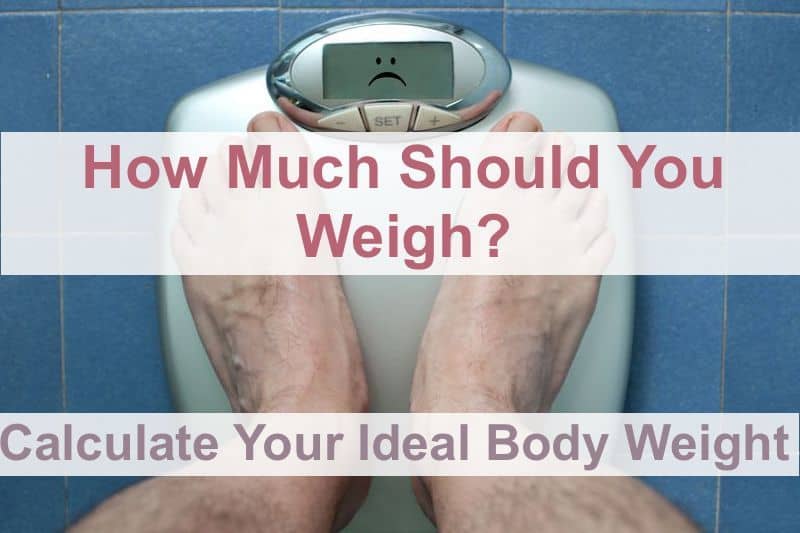
HOW MUCH should you weigh is a question each of us have asked ourselves many times over the years. You will get different answers to what seems to be a basic question depending on:
- Whom you ask,
- Your objective, and/or
- By what means you calculate what your body weight should be.
Using myself as the guinea pig, I’m going to review two ways you can calculate how much you should weigh. (In some cases, only one makes sense.)
The intent is to show you how variable is the answer to the question, “How much should you weigh?” It depends on the inputs (variables) to the body weight calculators and what you’re really trying to measure.
I’ll tell you right up front, that what you should be trying to measure is body fat. How much you should weigh (and your ideal body weight) ought to be determined by a measurement of body composition, which is to say your proportion of body fat to lean body mass.
Before we get into what’s ideal, let’s spend some time reviewing what you’re likely to encounter when examining various charts indicating how much you should weigh, including how your doctor is likely to measure it.
Here’s what we’re going to cover:
- How to calculate your Body Mass Index
- My BMI
- How to calculate your Body Fat
- My body fat percentage
- BMI vs Body Fat calculations
- What to do if you have more fat than you want
- An incentive to live longer and better
Let’s dig in…
Calculate Your BMI — Body Mass Index
This is the Gold Standard for quickly assessing if you’re underweight, overweight or just right, but if you’re relatively short, tall or have more muscle on your frame than the average bear, then BMI is the Bullshit Standard.
Take me for example.
This is a silly picture of me hawking pre and probiotics taken a few years ago, but my body looks the same now:

Joe holding his kefir and probiotics
I don’t look overweight, do I?
But according to my BMI, I’m overweight. I’ll get to that in a moment, but first a brief description about what BMI is and its limitations.
BMI Is Inaccurate If You’re Different, Even A Bit
BMI is a measurement of your leanness or chubbiness based on your height and weight, but this measurement does neither if your body deviates from the norm, particularly as concerns muscle. Simply put:
BMI does not take body composition into account.
The value obtained from the calculation of BMI is used to categorize whether a person is underweight, normal weight, overweight, or obese depending on what range the value falls between. (See chart below.)
Being overweight or underweight can have significant health effects, so the medical profession wanted to assess this by relying on a standard, easy to use measurement of body weight ranges, and is now used as an indicator of whether any more testing or action is required.
Sarah Jacoby points out in her BMI article on Refinery29 that nearly 30% of participants considered obese by the BMI were actually totally healthy based on their biomarkers. What’s more, 47% of those considered overweight were also healthy.
BMI is further influenced by factors such as:
- age
- sex
- ethnicity
- muscle mass
- body fat
- activity level
For example, older people considered to be at a healthy weight, but are completely inactive may have significant amounts of excess body fat even though they are not heavy. People in this scenario are unhealthy. In contrast, people with higher muscle composition with the same BMI would be considered healthy.
Given that muscle is heavier than fat, it’s common that by the BMI measure athletes are deemed overweight (and thus unhealthy), even though that’s completely untrue, because their weight reflects a body composition composed of more muscle than the norm.
Generally, according to the CDC:
- Older adults tend to have more body fat than younger adults with the same BMI.
- Women tend to have more body fat than men for an equivalent BMI.
- Muscular people and highly trained athletes may have higher BMIs due to large muscle mass.
Not only is it frustrating to not know if your BMI is accurate, but it’s being used by your doctor to diagnose a health problem and by your insurance company to determine premiums. If your BMI is inaccurate — indicating that you’re underweight or overweight — you might have a problem.
What’s Your BMI?
What follows is a BMI table and chart. I got these and the rest of the BMI and body fat images from Calculator.net.
Scroll down to see what the BMI measurement says about how much you should weigh.
BMI Table for Adults
This is the World Health Organization’s (WHO) recommended body weight based on BMI values for adults. It is used for both men and women, age 18 or older.
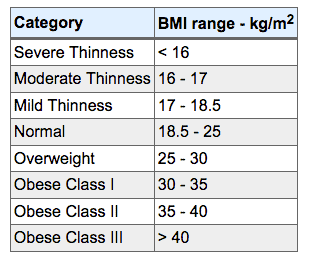
BMI chart for adults
This is a graph of BMI categories based on the World Health Organization data.
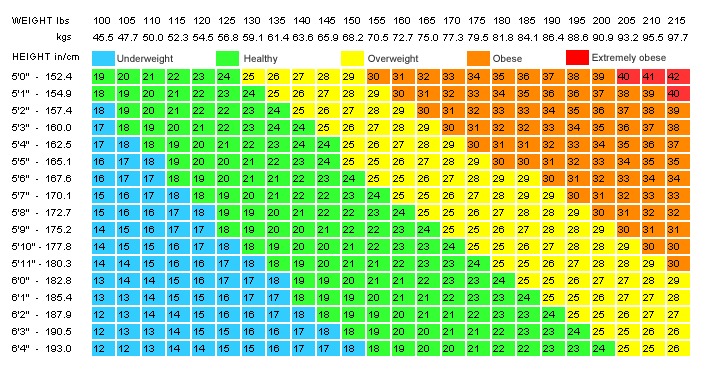
Joe’s BMI
The chart above indicates that my BMI is between 25 and 26.
To cross check the chart, I clicked over to the BMI calculator on Calculator.net and see what the calculator tool there would present. Here’s a screen shot with my inputs and results:
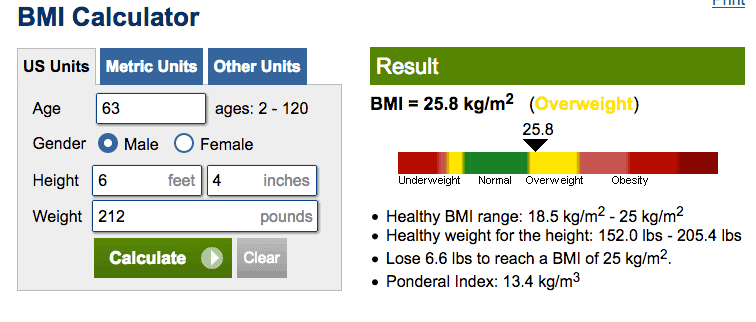
At 25.8, the BMI calculator is nearly exactly the same as what the table showed (between 25 and 26). And as you can clearly see on the colored bar above, 25.8 puts me in the “Overweight” group.
Well, let’s not stop here… let’s see how much you should weigh based on other calculations.
Calculate Your Body Fat
In my humble opinion, how much should you weigh depends on how much body fat you’re willing to haul around, based upon a few factors such as health, physical capabilities, age and physical aesthetics — in that order.
In just a bit, I’ll show you how I fared with Calculator.net’s body fat calculation and how that compares to my BMI, but first let’s get a sense of what body fat is and does.
A Primer On Body Fat: Too Much Body Fat and Much Too Much Body Fat
Body fat is “adipose tissue,” and its primary purpose is to store lipids (fatty acids or their derivatives) from which your body creates energy. It also secretes important hormones and provides the body with some cushioning as well as insulation.
Body fat includes essential body fat and storage body fat.
Essential body fat is a base level of fat that is found in most parts of your body, and is needed to keep up life and reproductive functions. The amount of essential fat differs between men and women:
- Essential fat in men is between 2 and 5%
- Essential fat in women is between 10 and 13%
The essential fat range is below that of the healthy fat range:
- Healthy fat in men is between 8 and 15%
- Healthy fat in women is between 21 and 33%
Storage fat is fat that accumulates in adipose tissue, be it subcutaneous fat (deep under the dermis) or visceral fat (fat located inside the abdominal cavity, between organs). References to body fat typically refer to this type of fat. While some storage fat is ideal, excess amounts of storage fat can have serious negative health implications.
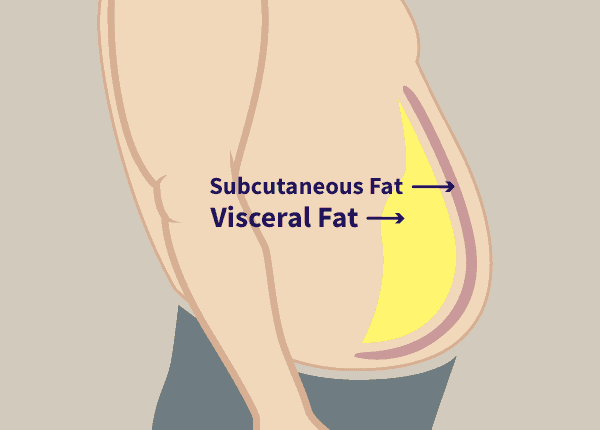
Image credit: FitWeightCare.com
Note that both women and men store body fat differently and that this can change over time. After the age of 40 (or after menopause in some cases for women), reduced sexual hormones can lead to excess body fat around the stomach in men, or around the buttocks and thighs of women.
Potential Health Complications From Excess Body Fat
The World Health Organization (WHO) classifies obesity as one of the leading preventable causes of death worldwide, estimated to claim 111,909 to 365,000 deaths per year in the U.S. This has been a growing cause for concern because 36.5% of U.S. adults are defined as obese, according to the Centers for Disease Control and Prevention.
Obesity is associated with a reduction in quality of life, poorer mental health outcomes, obstructive sleep apnea, as well as multiple leading causes of death worldwide such as cardiovascular disease, stroke, certain cancers and diabetes. All of these potential complications have the ability to cut a person’s life expectancy.
Furthermore, body fat, specifically visceral fat, has a role in the release of specific cytokines — a broad category of proteins involved in cell signaling — that can increase the risk of cardiovascular disease.
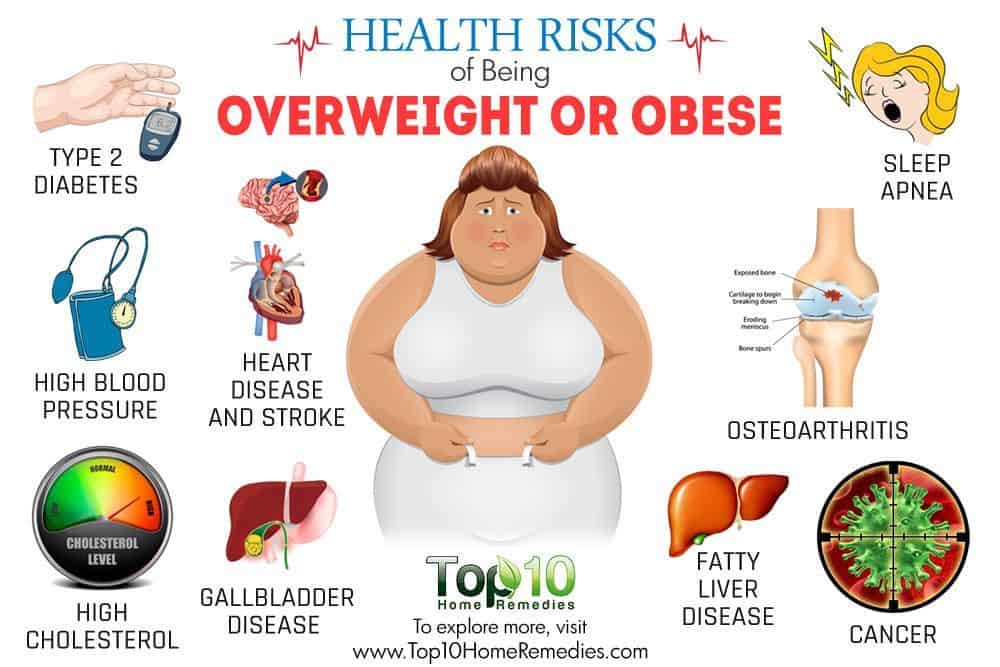
According to Harvard Health Publishing, visceral fat is also directly associated with higher levels of low-density lipoprotein (LDL) cholesterol, lower high-density lipoprotein (HDL) cholesterol, and insulin resistance. LDL cholesterol is commonly called “bad cholesterol” while HDL is referred to as “good cholesterol.”
High levels of LDL cholesterol can clog arteries and lead to complications including heart attacks. Insulin resistance involves cells not properly responding to the hormone insulin, which can lead to high blood sugar levels, and eventually to type 2 diabetes.
Read:
Will Your Belly Fat Cause Cancer?
Read Just “Exactly” How Fat Are You Anyway?
Why Your LDL Cholesterol Particle Size Determines Your Heart Disease Risk and What To Do About It
Body Fat Charts
How much body fat is acceptable to you?
Take a look at what’s deemed to be the Essential Fat through Obese range, and the ideal body fat percentages, which, unfortunately in this case, doesn’t go beyond age 55.
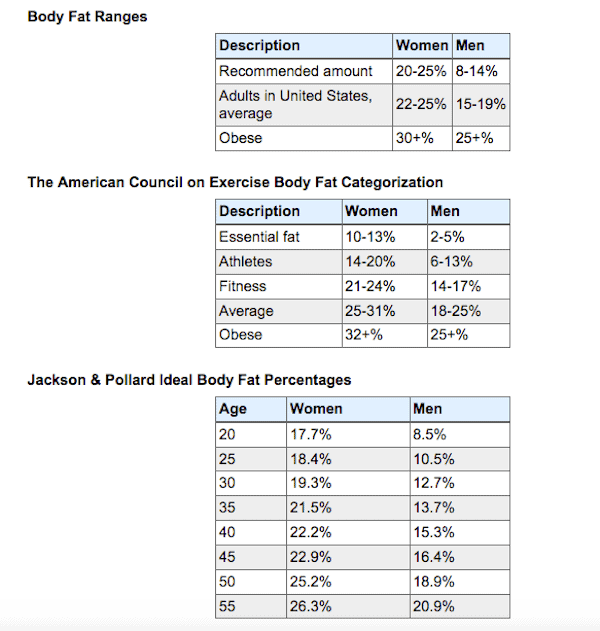
Given that I’m over 55, if my body fat was 20.9%, I’d meet the Jackson & Pollard standard for “Ideal,” but frankly that mark would be too high for me. At the max, I’d like my body fat to in the 14 to 17% range that the “American Counsel” suggests for “Fitness”.
Let’s see how I do.
Joe’s Body Fat
Finally to the moment of truth, my body fat using Calculate.net’s handy calculator, which is based on the U.S. Navy method.
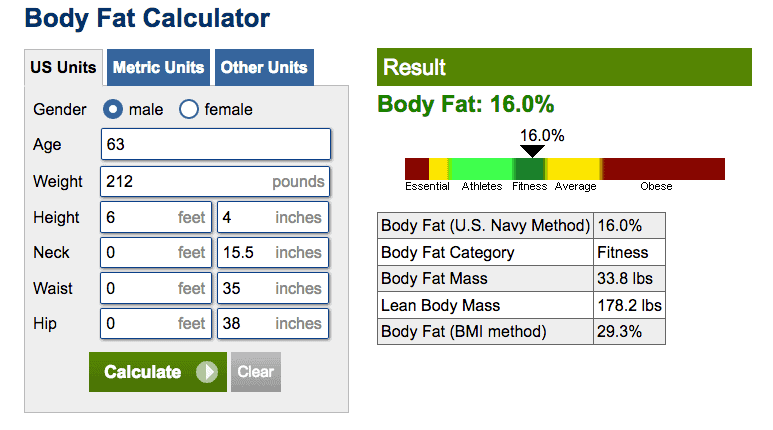
Sure enough, according to the Navy Method as detailed above, at 16%, my body fat percentage puts me in the “Fitness” category. (Calculate yours here.)
How much should you weigh? BMI vs Body Fat
At the beginning of this piece, I told you that, depending on body composition, BMI can be a bogus measurement of healthy weight.
If you don’t have more muscle than the average person of your height and weight, than BMI is a pretty accurate measurement of how much should you weigh. You can cross reference the BMI chart above, look for “Healthy” weight for your height and weight and see the number.
For me that “Healthy” weight number on the BMI chart is between 19 and 24, but as I said above, my actual weight of 212 pounds puts me in the “Overweight” category for a person six-foot four inches tall — a BMI between 25 and 26.
Happily, my body composition nullifies that BMI result. Enough of my 212 pounds is muscle to put me in the “Fitness” category in the Navy test, which calculates my body fat at 16%, well below, incidentally, the Jackson & Pollard standard for “Ideal,” which is 20.9% for men at 55 years of age, younger than I am.
Conclusion:
To learn how much should you weigh, calculate your ideal body weight based on your body fat.
Calculate Your Body Fat
What To Do If You’re Overfat
To be “overfat” is simply having a body composition having more fat than you want or is healthy.
Most of us living in the industrialized world are overfat. We have immediate access to food all the time and have to expend very little physical energy to get it. Moreover, the food is typically calorically dense and has little fiber or nutrition.
That’s a recipe for becoming overfat.
So, what do you do?
Just the opposite of what got you overfat:
- Move a lot — don’t sit all day, but get up every hour and move enough to get a bit breathless
- Move under resistance — walk up steep hills, do calisthenics or lift weights
- Eat real food — select food to eat that looks like it did when on the farm
One more thing is helpful:
Know the number of calories you can consume each day to reach the body weight desired.
As you might imagine, there’s a calculator for that.
The Calorie Calculator can be used to estimate the number of calories you can to consume each day given the weight you want.
Here are my inputs:
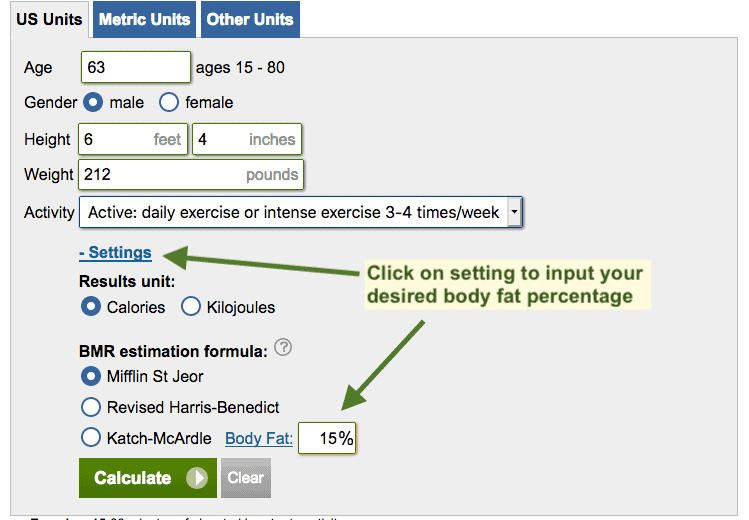
These are my results:
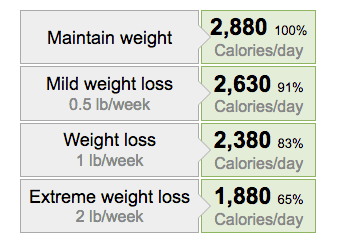
So, if I’m happy at 16% body fat, I can continue to eat 2,880 calories per day. If I want to lose one pound a week, I need to eat 17% fewer calories (83% of 2,880), or 2,380 calories each day.
Counting calories is a pain, but the leaner you want to be the more it’s likely that you need to become very aware of the caloric content of the food you eat. I have yet to count calories, but I might start doing so, because I’d like to get below 15% body fat.
Read: 8 Surefire Ways to Trim Body Fat and Keep It Off Forever
An Exercise Incentive — Live Longer and Better
As I’ve written before, you can’t outrun the fork. Your diet is the single most important factor in cutting body fat. But there’s another thing that means a lot when it comes to longevity.
As reported in Newsmax, a new study found that:
People who were most fit were more than twice as likely to be alive a decade later than the least fit.
The study involved more than 6,500 people, age 70 and older, who had an exercise stress test between 1991 and 2009. The test measured their fitness by having them exercise on the treadmill as hard as they could. After the test, participants were tracked for an average of just under 10 years.
Said lead author Dr. Seamus Whelton, assistant professor of medicine at Johns Hopkins School of Medicine:
We found fitness is an extremely strong risk predictor of survival in the older age group — that is, regardless of whether you are otherwise healthy or have cardiovascular risk factors, being more fit means you’re more likely to live longer than someone who is less fit.
If you need some tips on how to get started on eating better, check out:
- 11 Ways You Can Control Overeating and Body Fat
- The ProLon Fasting Mimicking Diet — Get Better, Not Older
- 3 Great Reasons To Do Intermittent Fasting (and 4 Ways To Do It.)
If you need some tips on how to get started on exercise, check out:
- Try HIIPA In Your HIIT Workout Plan
- Why You Must Exercise for Longevity and How To Do It
- 7 Life-saving Reasons Exercise Is The Ultimate Anti-aging Pill
Your Takeaway
When thinking about how much you should weigh, remember:
- BMI is inaccurate if you’re very tall, very short or have more muscle than average
- Body fat is a better indicator of health than BMI
- Lose body fat by:
- Eating real food, not too much
- Moving a lot, every hour
- Moving under resistance (calisthenics and/or weight lifting)
- Knowing the daily caloric target for your body weight target based on desired body fat composition
- Recruiting a buddy with similar goals as you and hold each other accountable
That’s it, folks.
Last Updated on February 28, 2022 by Joe Garma


